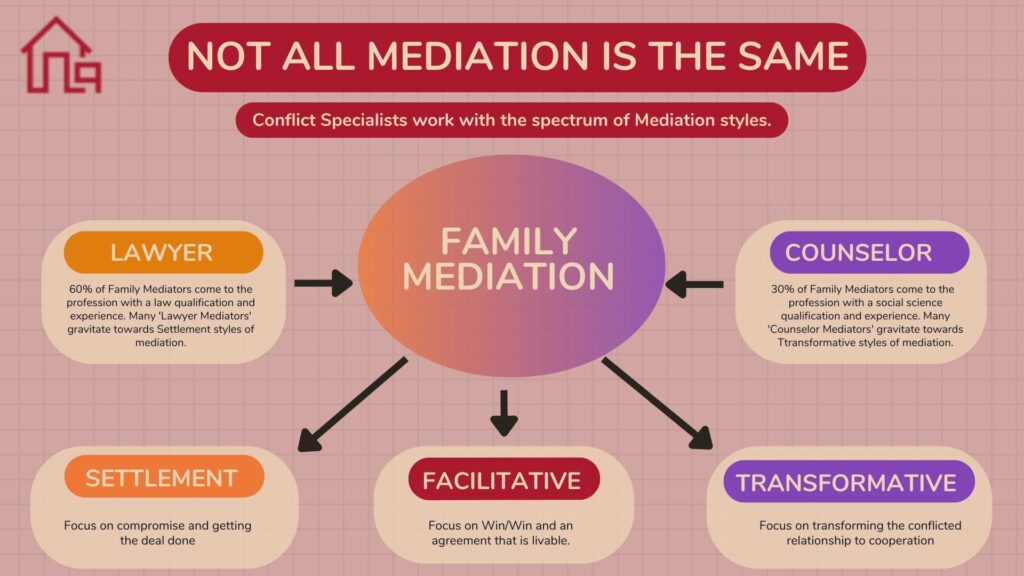
Not all Mediation is the Same: Understanding Evaluative, Facilitative, and Transformative Family Mediation
Family mediation is a valuable process that helps families resolve conflicts and make important decisions. There are different approaches to mediation, each with its own unique focus and methodology. There are three main types of family mediation: Evaluative (sometimes called Settlement Mediation or Conciliation), Facilitative, and Transformative.
Evaluative Mediation
Evaluative mediation is a more directive approach where the mediator provides guidance and suggestions based on law and their expertise if they are also a lawyer. The lawyers evaluate the issues at hand and offers opinions on the likely outcomes if the case were to go to court. This type of mediation is often used when parties need a clear understanding of their legal standing and potential consequences. Family Mediators can also provide expertise on the impact to children of any proposed agreement.
Key Features:
• The lawyer for each side can assesses the strengths and weaknesses of each party’s case.
• Lawyers provide recommendations and possible solutions to their clients.
• Focuses on reaching a settlement that aligns with legal standards.
Benefit’s:
• Helps parties understand the legal implications of their decisions.
• Can expedite the resolution process by providing clear guidance.
• Useful in high conflict cases where just getting an agreement is needed.
However, it has some drawbacks:
• Not build trust or improve communication between the parties.
• With a lack of trust the agreement has a higher chance of failure.
Facilitative Mediation
Facilitative mediation is a more collaborative approach where the mediator helps parties communicate and explore their interests and needs. A collaborative approach to negotiation involves all parties working together to find mutually beneficial solutions, focusing on open communication, shared interests, and creative problem-solving. This method aims to build trust and maintain positive relationships while addressing everyone’s needs and concerns. The aim is a win/win for both parties.
The mediator does not provide opinions or recommendations but instead facilitates discussions to help parties find mutually acceptable solutions.
Key Features:
• The mediator encourages open communication and active listening.
• Focuses on identifying underlying interests and needs.
• Empowers parties to create their own agreements.
Benefits:
• Promotes better understanding and cooperation between parties.
• Encourages creative and personalized solutions.
• Helps build stronger relationships and long-term resolutions.
Transformative Mediation
Transformative mediation is an approach that focuses on empowering parties and fostering mutual recognition. The goal is not just to resolve the immediate conflict but to transform the relationship and communication patterns between the parties.
Key Features:
• The mediator supports parties in expressing their emotions and perspectives.
• Encourages empathy and understanding between parties.
• Aims to transform the way parties interact and communicate.
Benefits:
• Helps parties develop better communication skills.
• Can lead to deeper, more meaningful resolutions.
• Focuses on long-term relationship improvement and personal growth.
Choosing the Right Mediator
The choice of mediation approach depends on the specific needs and circumstances of the parties involved. Evaluative mediation may be suitable for cases requiring legal clarity, while facilitative mediation is ideal for those seeking collaborative solutions. Transformative mediation is best for parties looking to improve their relationship and communication.
Many mediators tend to stick to the approach they are most familiar with. However, the Conflict Specialist Mediators that are trained and well experienced in all 3 approaches to mediation can provide a bespoke mediation to their clients drawing on more than just one approach to mediation if needed.
When choosing a Family Mediator, look at what their qualifications and experience is. Most Family Mediators offer a free consultation, it’s a great opportunity to find out if they listen and understand your needs, and you get to ask the questions.
